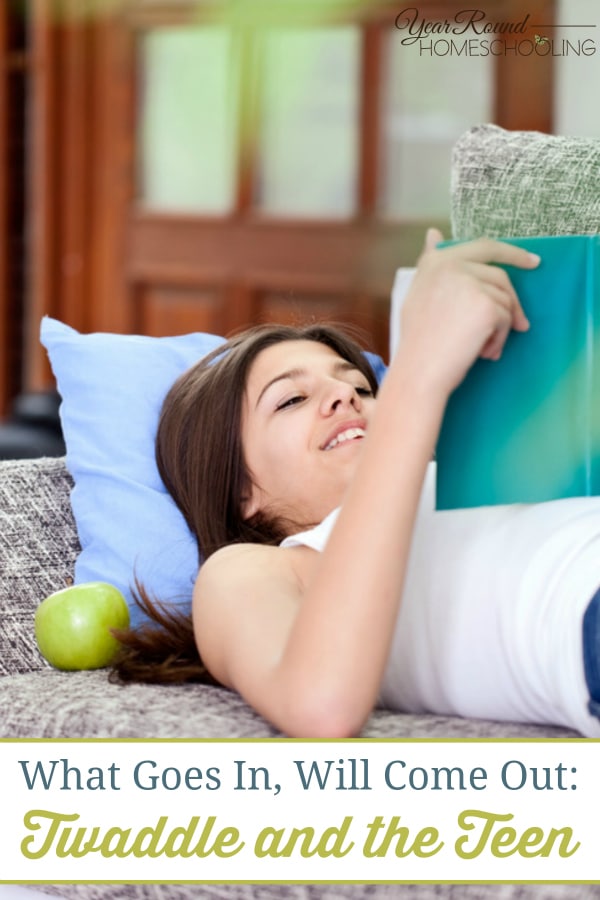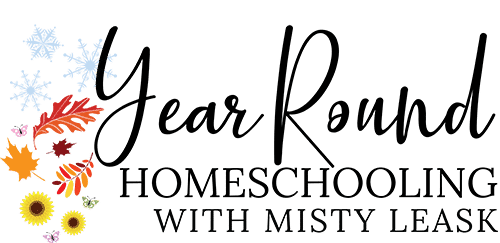As a young parent, I chose to guard my children’s minds and hearts when they first began to read. I encouraged my young readers to choose books like Frog and Toad, and Little Bear. When they were reading more proficiently, I led them to titles such as Winnie the Pooh , Paddington Bear, and Charlotte’s Web, while avoiding books filled with bad attitudes and unrepentant, unchecked, foolish behavior. I knew that the books my children read, would likely influence their heart attitudes and behavior. When they were young, they needed me to be their filter. At that stage of development, I felt that children should be given books that improve their hearts and minds, rather than ones that caused them confusion about what was right and wrong, or would give them examples that might lead them astray. They needed my protection, much more than they needed entertainment value.

What Goes In, Will Come Out: Twaddle and the Teen
As my children grew into their teens, I continued an open dialogue about all forms of media, but especially, literature. I felt it was important to teach them to evaluate literature , because unlike a movie, which is consumed for about an hour and a half, children spend hours upon hours, if not days, in a book. It became clear to me as we experienced a variety of literature that every book taught something, but not all lessons were worth learning, if it meant that we had to wade through too much muck and mire to get there. For example, on the shelf of every public library you can find many books about dystopian societies, but for the sake of this article, let’s look at two popular books:
Animal Farm by George Orwell
Divergent by Veronica Roth
Animal Farm is a classic – an allegorical and satirical novel reflecting the Russian Revolution of 1917 up into the Stalin era. I read it aloud to my teens when they were fifteen and thirteen years old. We had many excellent discussions, and as a whole, the book gave us an opportunity to better understand the world, “gone wrong.” Animal Farm helped us look at historical topics more clearly and provided opportunities for critical thinking and debate.
Contrast that with a series that my son became interested in because of a movie that came out last year. The Divergent series looked so interesting, and many of our young friends had recommended it to us. My sixteen year old picked it up and began to read. He finished the first book and warned me that there was quite a bit of sexuality and questionable moral decisions. He was unsure whether he could recommend it to others. On one hand, the story was captivating, but on the other hand, “What are these characters thinking?” I decided to read the first book and then the rest of the series to see if it was as bad as it seemed. We want children to practice filtering ideas, but I was concerned that my son was over-filtering since so many of our friends had been impressed with this series. I was disappointed to discover that Divergent was nothing more than a immature teenage soap opera. The Divergent series is the definition of twaddle. (If you want more information on Divergent, hop over to Amazon and read the one star reviews.)
twaddle – Silly, idle talk; drivel. Something insignificant or worthless. ~Merriam Webster Dictionary
Charlotte Mason teaches us that children, “must grow up upon the best. There must never be a period in their lives when they are allowed to read or listen to twaddle or reading-made-easy. There is never a time when they are unequal to worthy thoughts, well put; inspiring tales, well told.” (Volume 2, p. 263). When we encourage our young people to choose worthy books, what will arise from them are worthy thoughts.
I realized during this experience that while my son is sixteen, and successfully uses the critical thinking skills I have taught him, he still needs my guidance in evaluating literature. I can’t help but think if we were more cautious about the media input our children digest on a regular basis, that we might not see as much emotional and spiritual angst in our community of young people. Just as it was when my children were little, the principle remains the same: What goes into a young person, will come out, if left unchecked. I am thankful that the Lord led me to cultivate a lifestyle of evaluation and discussion as it pertains to books, movies, art and music.
Let’s face it, young people will often prefer twaddle. “What manner of book will find its way with upheaving effect into the mind of an intelligent boy or girl? We need not ask what the girl or boy likes. She very often likes the twaddle of goody-goody story books, he likes condiments, highly-spiced tales of adventure. We are all capable of liking mental food of a poor quality and a titillating nature.” Charlotte Mason, (Vol. 3, p. 168). It is the age old problem of teaching our children to prefer nutritional food over junk.
It is not necessary to censor all books, but it is necessary to evaluate the child and the books he or she reads, as well as helping them develop filtering skills.
Before giving a child a book, consider the following:
1. Is my child ready for this book? Is it appropriate to their development? Can my child rightly filter the content?
2. Is there sin in this book that might influence my particular child, at this particular time, in a negative way?
3. If there is sin in this book, are there clear consequences? Is a lesson learned? Or is the sin left unchecked or even encouraged?
4. Is right and wrong clearly defined? If not, how will I, as a parent, provide guidance?
As a parent, I have decided to check in with my kids about the books they read, even if they are reading for fun! No matter their ages, I am a fan of the socratic method when it comes to discussing literature. This is a way to show interest in your child’s world, while at the same time, giving their inner filters a check up, and providing an opportunity for instruction and guidance. As a homeschooling parent, I am obligated to educate my children in humanities. I assign Jane Austin, Shakespeare, and Tolkien, but does my job end there? I don’t think so. I feel obligated to educate my children in evaluating every book they read. They must develop their own filters before they go out into the world, so they won’t be unduly influenced. I use socratic discussion to develop these filtering skills.
Socratic Questions for Any Book
Where does the story happen? Does it make you want to hop into the book and see it for yourself?
What kinds of people are in the story? How do they live? Do you like them? Why, or why not?
Does the story happen in a particular time or era? What is the mood of that time? Would you want to live then? Why?
What period of life are the characters currently in? Are they children? Adults? Would you want to walk in their shoes? Why?
What do the characters say about themselves to other people? Are the words positive, negative or neutral? What is the most important thing to the main character? Supporting characters? Antagonist? If you were to write a book, what would you say about yourself to other people?
What are the values of the culture or society in the book you are reading?
How do the words and actions of the character affect the other characters?
Is the antagonist truly evil, or does he just oppose the protagonist? Have you ever experienced opposing someone’s views? Was the person you opposed evil, or did they just have a different opinion?
What are the impediments or obstacles facing the protagonist? What kind of conflict is occurring? What are possible solutions to the problem? What would you do? What did the characters do? Do you agree or disagree with their actions? Why?
What is the character learning in this situation?
Is there sin in the storyline? Are there consequences for wrong behavior?
Is there quality vocabulary in this book? Is it well written? Why or why not? What are some qualities of well written books? Does the author use imagery, contrasts and comparisons, metaphor, similes and personification to help the reader experience the story?
What is the theme of the story? What lesson does the character learn about himself or the world as he goes through his journey?
Are you able to discern what the author believes is true from reading this book? Are you able to discern the author’s religion? Political party? Social causes? World view? How is the author using his or her influence? Did the book influence you to think rightly or does it encourage any type of wrong thinking?
These discussions do not have to be formal in any way! Talk about books at the dinner table, while peeling vegetables, or while playing cards. Read aloud to your children and discuss the book along the way. Make read aloud time a pleasurable event. In the winter months, light a fire, provide hot cocoa and a snack. Let little ones play with Legos or draw quietly while you read. Allow literature to become part of your lifestyle and never stress over it! See these times as opportunities to know your children more deeply and as a means to grow together in the journey of homeschooling. In teaching your children to filter the ideas found in books, you are training them to destroy, “speculations and every lofty thing raised up against the knowledge of God,” (2 Corinthians 10:5) and are providing them practice with taking their thoughts captive to the obedience of Christ.
Helpful Resources:
Teaching the Classics (Seminar Workbook Only)
Books That Build Character: A Guide to Teaching Your Child Moral Values Through Stories
Grateful for grace,

